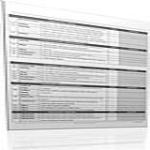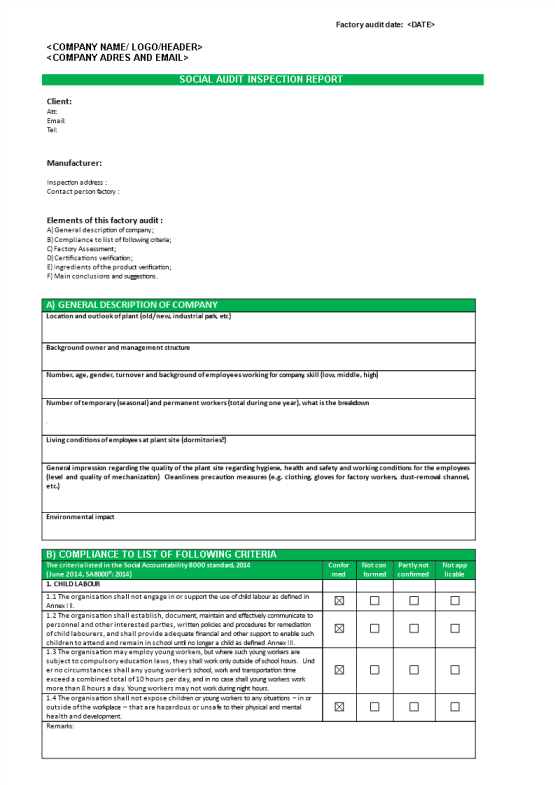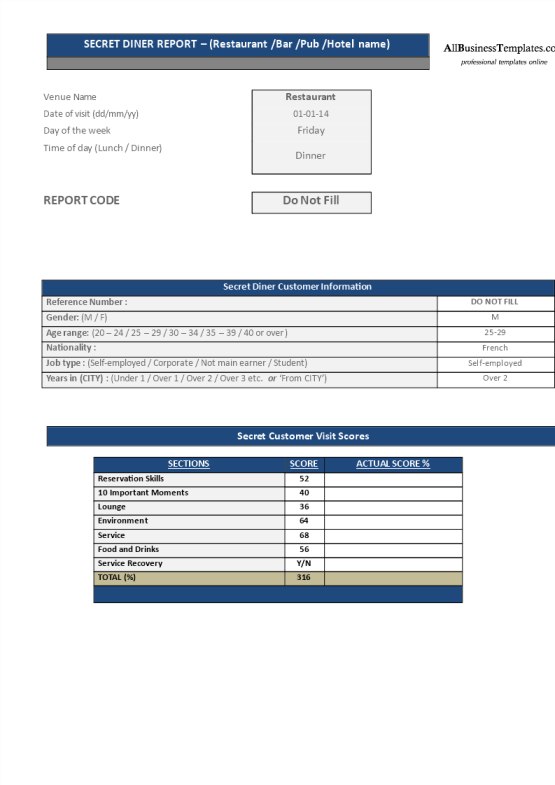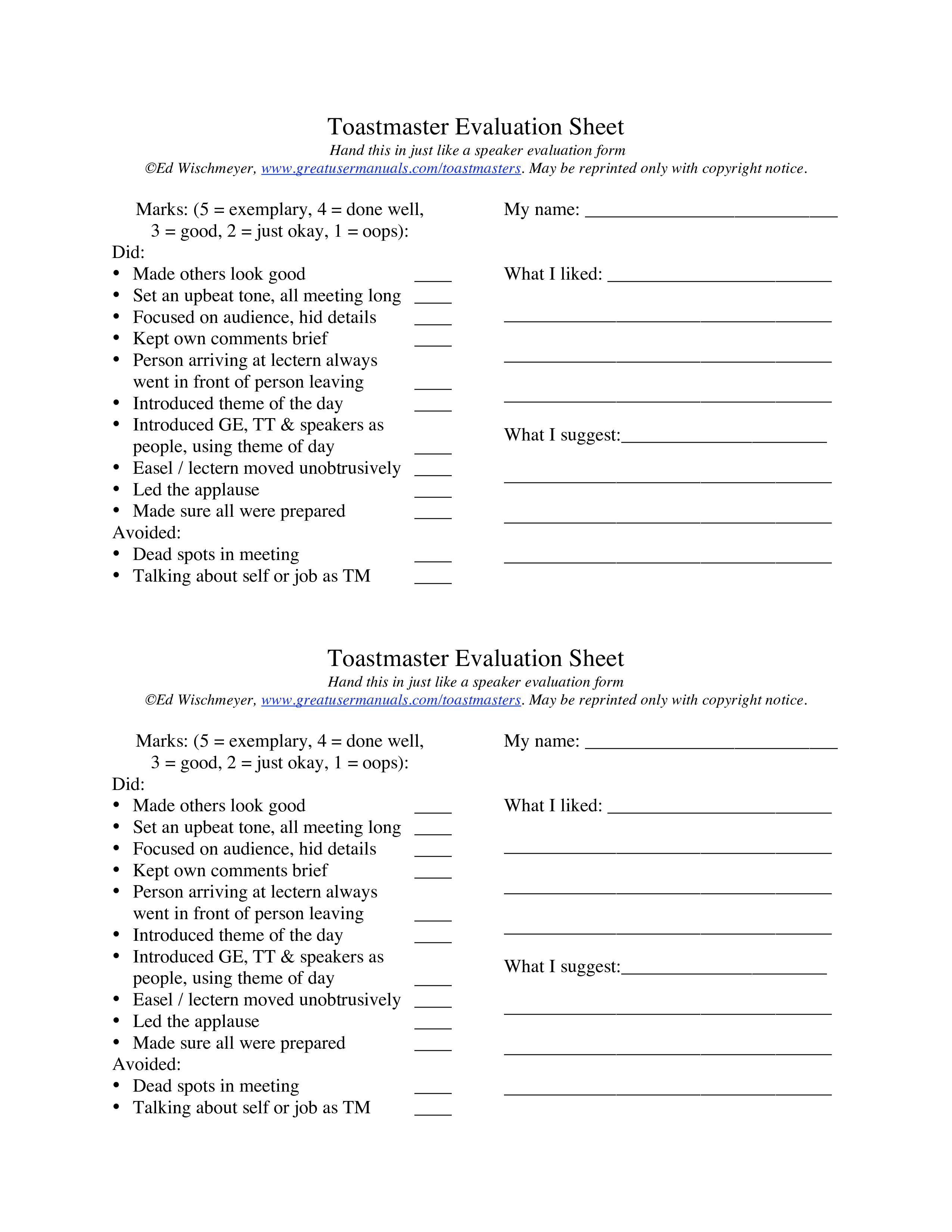Toastmaster Evaluation
Save, fill-In The Blanks, Print, Done!

Download Toastmaster Evaluation
Adobe Acrobat (.pdf)- This Document Has Been Certified by a Professional
- 100% customizable
- This is a digital download (43.48 kB)
- Language: English
- We recommend downloading this file onto your computer.
Are you looking for a Toastmasters evaluation form template? What should you include in a Toastmasters evaluation? This template is designed to help you assess the performance of an individual in your Toastmasters club. It's the perfect tool for providing constructive feedback and helping your members grow. Get this template now and start using it immediately.
A Toastmasters Evaluation Form is a structured document or tool used by Toastmasters club members to provide feedback and assessments on a speaker's presentation or speech during a Toastmasters meeting. These forms are designed to ensure that evaluations are comprehensive, constructive, and aligned with Toastmasters International's evaluation guidelines. The primary purpose of a Toastmaster Evaluation Form is to help speakers improve their public speaking skills by providing specific feedback on their performance.
Here are the typical elements you might find on a Toastmaster Evaluation Form:
- Speaker's Name: The name of the speaker being evaluated.
- Evaluator's Name: The name of the Toastmasters club member providing the evaluation.
- Date: The date of the Toastmasters meeting.
- Project or Speech Title: The title or project number/name of the speech being evaluated. In Toastmasters, speeches are often part of a specific educational program or manual.
- Objectives: A section that outlines the specific objectives or goals of the speech project. These objectives are typically provided in the Toastmasters manual for the respective project.
- Evaluation Criteria: This section lists the evaluation criteria used by Toastmasters, which may include aspects like organization, speech content, vocal variety, body language, gestures, and overall effectiveness. The evaluator rates the speaker's performance on each criterion.
- Strengths: The evaluator highlights the speaker's strengths and positive aspects of the speech. This can include specific examples of effective communication techniques.
- Areas for Improvement: The evaluator points out areas where the speaker can improve. This is often accompanied by constructive suggestions and examples to help the speaker understand how to enhance their skills.
- Recommendations: The evaluator offers specific recommendations for the speaker to work on in future speeches. These recommendations are intended to guide the speaker's development.
- Comments: There is typically space for additional comments or feedback that may not fit within the predefined sections.
- Overall Evaluation: The evaluator provides an overall assessment of the speech's effectiveness and its alignment with the objectives of the project.
- Time Management: Some Toastmaster Evaluation Forms include a section to evaluate the speaker's use of time, ensuring that they adhere to the prescribed time limits for their speech.
Toastmaster Evaluation Forms are a valuable tool for both the speaker and the evaluator. They provide a structured framework for providing feedback, which helps speakers identify their strengths and areas for improvement. The constructive feedback given through these forms is a key component of Toastmasters' approach to helping members develop their public speaking and leadership skills.
Those individuals, who make the biggest impacts, have, what we call, a "high-performance mindset” and are often using professionally designed templates to achieve their goals faster!
Try out our online Free and Premium Professional templates, forms, and contracts today.
Save, fill in the blanks, print …and done!
DISCLAIMER
Nothing on this site shall be considered legal advice and no attorney-client relationship is established.
Leave a Reply. If you have any questions or remarks, feel free to post them below.
Related templates
Latest templates
Latest topics
- Christmas Templates
It's Christmas... Be prepared with nice Christmas letters, invitations, social posts etc and check out these Christmas templates now! - GDPR Compliance Templates
What You Need To Be DPR compliant? Are you looking for useful GDPR document templates to make you compliant? All these compliance documents will be available to download instantly... - Google Sheets Templates
How to work with Google Sheets templates? Where to download useful Google Sheets templates? Check out our samples here. - Drop Shipping Agreement
How to start drop shipping? Do you need a Drop shipping Agreement? Check out our Dropshipping Agreement templates now! - Excel Templates
Where to find usefl Excel templates? How do I create a template in Excel? Check these editable and printable Excel Templates and download them directly!
cheese




